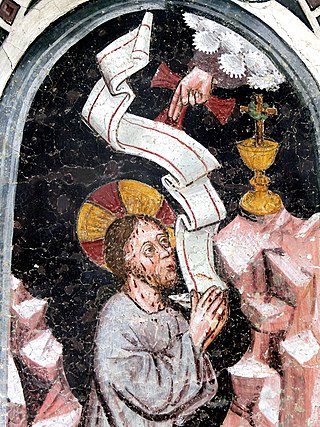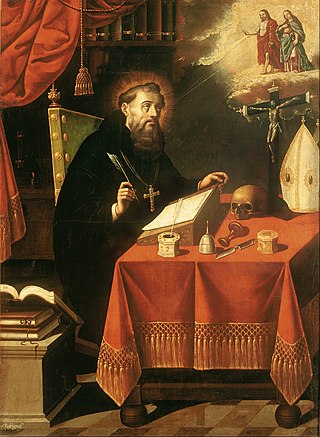Related Research Articles
Christian eschatology is a minor branch of study within Christian theology which deals with the doctrine of the "last things", especially the Second Coming of Christ, or Parousia. The word eschatology derives from two Greek roots meaning "last" (ἔσχατος) and "study" (-λογία) – involves the study of "end things", whether of the end of an individual life, of the end of the age, of the end of the world, or of the nature of the Kingdom of God. Broadly speaking, Christian eschatology focuses on the ultimate destiny of individual souls and of the entire created order, based primarily upon biblical texts within the Old and New Testaments. Christian eschatology looks to study and discuss matters such as death and the afterlife, Heaven and Hell, the Second Coming of Jesus, the resurrection of the dead, the rapture, the tribulation, millennialism, the end of the world, the Last Judgment, and the New Heaven and New Earth in the world to come.
Speaking in tongues, also known as glossolalia, is an activity or practice in which people utter words or speech-like sounds, often thought by believers to be languages unknown to the speaker. One definition used by linguists is the fluid vocalizing of speech-like syllables that lack any readily comprehendible meaning. In some cases, as part of religious practice, some believe it to be a divine language unknown to the speaker. Glossolalia is practiced in Pentecostal and charismatic Christianity, as well as in other religions.

The Rapture is an eschatological position held by some Christians, particularly those of American evangelicalism, consisting of an end-time event when all dead Christian believers will be resurrected and, joined with Christians who are still alive, together will rise "in the clouds, to meet the Lord in the air."

A spiritual gift or charism is an extraordinary power given by the Holy Spirit. These are believed by followers to be supernatural graces that individual Christians need to fulfill the mission of the Church. In the narrowest sense, it is a theological term for the extraordinary graces given to individual Christians for the good of others and is distinguished from the graces given for personal sanctification, such as the Seven Gifts of the Holy Spirit and the fruit of the Holy Spirit.
Dispensationalism is a theological framework for interpreting the Bible which maintains that history is divided into multiple ages called "dispensations" in which God interacts with his chosen people in different ways. It is often distinguished from covenant theology. These are two competing frameworks of Biblical theology that attempt to explain overall continuity in the Bible. Coining of the term "dispensationalism" has been attributed to Philip Mauro, a critic of the system's teachings, in his 1928 book The Gospel of the Kingdom.
In Christian eschatology, postmillennialism, or postmillenarianism, is an interpretation of chapter 20 of the Book of Revelation which sees Christ's second coming as occurring after the "Millennium", a messianic age in which Christian ethics prosper. The term subsumes several similar views of the end times, and it stands in contrast to premillennialism and, to a lesser extent, amillennialism.
Premillennialism, in Christian eschatology, is the belief that Jesus will physically return to the Earth before the Millennium, heralding a literal thousand-year messianic age of peace. Premillennialism is based upon a literal interpretation of Revelation 20:1–6 in the New Testament, which describes Jesus's reign in a period of a thousand years.
The concept of the kingship of God appears in all Abrahamic religions, where in some cases the terms kingdom of God and kingdom of Heaven are also used. The notion of God's kingship goes back to the Hebrew Bible, which refers to "his kingdom" but does not include the term "Kingdom of God".
Kingdom theology is a system of Christian thought that elaborates on inaugurated eschatology, which is a way of understanding the various teachings on the kingdom of God found throughout the New Testament. Its emphasis is that the purpose of both individual Christians and the church as a whole is to manifest the kingdom of God on the earth, incorporating personal evangelism, social action, and foreign missions.

Amillennialism or amillenarism is a chillegoristic eschatological position in Christianity which holds that there will be no millennial reign of the righteous on Earth. This view contrasts with both postmillennial and, especially, with premillennial interpretations of Revelation 20 and various other prophetic and eschatological passages of the Bible.

John 20:15 is the 15th verse of the twentieth chapter of the Gospel of John in the New Testament of the Christian Bible. Mary Magdalene has returned to Jesus' tomb and found it empty. She does not know that Jesus has risen from death and they begin conversing without her realizing his identity.
Allegorical interpretation of the Bible is an interpretive method (exegesis) that assumes that the Bible has various levels of meaning and tends to focus on the spiritual sense, which includes the allegorical sense, the moral sense, and the anagogical sense, as opposed to the literal sense. It is sometimes referred to as the quadriga, a reference to the Roman chariot that was drawn by four horses.

James Hall Brookes was an American Presbyterian pastor, Christian leader and author. Brookes led congregations in Ohio and Missouri during a career spanning 43 years. He became a leader among his peers in the Niagara Bible Conference which led to editing The Truth: or, Testimony for Christ, a periodical. His legacy is also found in the many books, booklets and tracts he produced.

The post-tribulation rapture doctrine is the belief in a combined resurrection and rapture, or gathering of the saints, after the Great Tribulation.

Futurism is a Christian eschatological view that interprets portions of the Book of Revelation, the Book of Ezekiel, and the Book of Daniel as future events in a literal, physical, apocalyptic, and global context.
James Moffatt was a Scottish theologian and graduate of the University of Glasgow.

Inaugurated eschatology is the belief in Christian theology that the end times were inaugurated in the life, death and resurrection of Jesus, and thus there are both "already" and "not yet" aspects to the Kingdom of God. George Eldon Ladd suggests that the Kingdom of God is "not only an eschatological gift belonging to the Age to Come; it is also a gift to be received in the old aeon."

The roles of women in Christianity have varied since its founding. Women have played important roles in Christianity especially in marriage and in formal ministry positions within certain Christian denominations, and parachurch organizations. In 2016, it was estimated that 52–53 percent of the world's Christian population aged 20 years and over was female, with this figure falling to 51.6 percent in 2020. The Pew Research Center studied the effects of gender on religiosity throughout the world, finding that Christian women in 53 countries are generally more religious than Christian men, while Christians of both genders in African countries are equally likely to regularly attend services.

Historic premillennialism is one of the two premillennial systems of Christian eschatology, with the other being dispensational premillennialism. It differs from dispensational premillennialism in that it only has one view of the rapture, and does not require a literal seven-year tribulation. Historic premillennialists hold to a post-tribulational rapture, meaning the church is raised to meet Christ in the air after the trials experienced during the Great Tribulation. Historic premillennialism does not require that apocalyptic prophecies be interpreted literally. The doctrine is called "historic" because many early church fathers appear to have held it, including Irenaeus, Justin Martyr, and Papias. Post-tribulational premillennialism is the Christian eschatological view that the second coming of Jesus Christ will occur prior to a thousand-year reign of the saints but subsequent to the Great Apostasy.

The Beast may refer to one of three beasts described in the Book of Revelation.
References
- ↑ Henry Alford, The Greek Testament, 4 volume ed., Vol. IV, s.v. Rev. 20:5.
- ↑ George Eldon Ladd, "Historic Premillennialism", in The Meaning of the Millennium: Four Views, ed. Robert G. Clouse (Downers Grove, IL: InterVarsity Press, 1977), pp. 37–38. Note: Ladd documents his citation as from a printing of Alford's work by Lee and Shephard, Boston, 1872, IV:732 (cp. Ladd, p. 214, note 10).
- ↑ The Greatness of the Kingdom: An Inductive Study of the Kingdom of God (Winona Lake, IN: BMH Books, 1959), p. 490.
- ↑ J. A. Seiss, The Apocalypse: Lectures on the Book of Revelation (Grand Rapids: Zondervan Publishing House, n.d., 4th reprint ed. 1962), pp. 461, 464.
- ↑ Encyclopedia of Biblical Prophecy (Grand Rapids: Baker Book House, 1980), p. 618, s.v. Prediction 32.
- ↑ W. E. B., Jesus Is Coming (Old Tappan, NJ: Fleming H. Revell Company, 1898, 1908, 1932), pp. 58–59. Blackstone documents this quote as from Alford's 2nd ed. (London: Rivington's, 1854), IV:726.
- ↑ The Theocratic Kingdom, 3 vols. (Grand Rapids: Kregel, 1952), II:291. Peters also referenced Alford's statement at II:281, note 3.
- ↑ Wayne Grudem, 1 Peter, Vol. 17 in the Tyndale New Testament Commentaries (Grand Rapids: William B. Eerdmans Publishing Co., 1988), p. 171, s.v. 1 Pet. 4:6.
- ↑ John Piper, "The Chief Design of My Life: Mortification and Universal Holiness, Reflections on the Life and Thought of John Owen", presented January 25, 1994, at the annual Bethlehem Conference for Pastors, s.v. the "Question and Answer" session from 1:30:11–1:30:31.